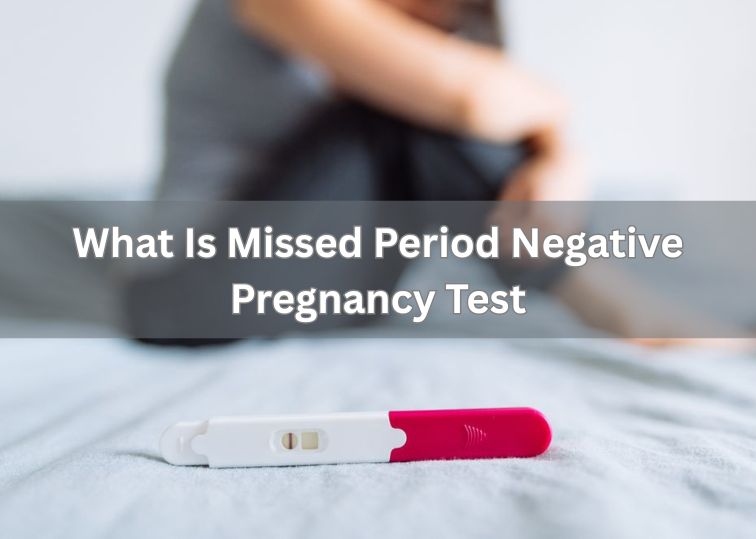Missing a period can be concerning, especially if you’re sexually active and wondering about pregnancy. A negative pregnancy test adds another layer of confusion. It’s important to understand that several factors can cause a missed period, and a negative test doesn’t always rule out pregnancy. Let’s break this down.
1. Understanding the Menstrual Cycle
The menstrual cycle is controlled by hormones, mainly estrogen and progesterone. It typically lasts about 28 days, though anywhere from 21 to 35 days is normal for many women. The cycle includes:
- Menstrual Phase: Shedding of the uterine lining (your period).
- Follicular Phase: Growth of follicles in the ovaries.
- Ovulation: Release of an egg around day 14 in a 28-day cycle.
- Luteal Phase: Body prepares for a potential pregnancy; if not pregnant, hormone levels drop, leading to menstruation.
A missed period usually happens if ovulation is delayed or if the luteal phase is affected.
2. When to Take a Pregnancy Test
Pregnancy tests detect the hormone hCG (human chorionic gonadotropin) in urine. The best time to test is after you’ve missed your period, typically around the first day of the missed period. Testing too early can result in a false negative because the hormone levels might not be high enough yet.
Tip: If you get a negative result but still suspect pregnancy, wait a few days and retest. Using a first-morning urine sample can increase accuracy because it’s more concentrated.
3. Causes of a Missed Period with a Negative Pregnancy Test
If your period is late and the test is negative, consider these common causes:
- Stress: High levels of stress can affect the hypothalamus, disrupting hormone signals that regulate your cycle.
- Weight Changes: Rapid weight gain or loss can impact menstrual function.
- Excessive Exercise: Intense physical activity can cause hormonal imbalances.
- Polycystic Ovary Syndrome (PCOS): A common hormonal disorder that can cause irregular periods.
- Thyroid Issues: Both hyperthyroidism and hypothyroidism can affect your cycle.
- Perimenopause: If you’re in your late 30s or older, irregular periods could be a sign of perimenopause.
- Chronic Conditions: Diabetes, celiac disease, and other health issues can impact menstrual health.
- Medications: Certain medications, like antidepressants or antipsychotics, can alter cycles.
- Illness: Severe illness or sudden changes in health can delay ovulation.
4. Ectopic Pregnancy: A Serious Concern
An ectopic pregnancy (where the fertilized egg implants outside the uterus) is rare but serious. Symptoms may include:
- Sharp pelvic or abdominal pain
- Shoulder pain
- Dizziness or fainting
- Heavy bleeding
If you experience any of these symptoms, seek medical attention immediately, even if your pregnancy test is negative.
5. When to See a Doctor
If you’ve missed your period and have a negative pregnancy test, consider seeing a healthcare provider if:
- Your period is more than a week late, and you have persistent symptoms of pregnancy (nausea, breast tenderness, fatigue).
- You experience severe pain, heavy bleeding, or signs of an ectopic pregnancy.
- You have irregular cycles and want to discuss birth control or cycle management.
- You’ve been trying to conceive and are concerned about fertility.
Your doctor might perform a blood test to detect hCG levels more accurately or conduct an ultrasound to check for pregnancy or other issues.
6. Other Possible Explanations
- Hormonal Imbalances: Elevated prolactin levels, for example, can inhibit ovulation.
- Hypothalamic Amenorrhea: A condition where the brain doesn’t signal the ovaries to produce hormones, often due to stress or low body fat.
- Asherman’s Syndrome: Scarring of the uterine lining can cause irregular periods.
7. What to Do Next
- Wait and Retest: If it’s only been a few days since your missed period, wait a bit and test again.
- Track Your Cycle: Note symptoms like cervical mucus changes, basal body temperature, and ovulation tests to understand your cycle better.
- Consider Lifestyle Factors: Reflect on recent stress, changes in weight, exercise, or health issues.
In Conclusion:
A missed period with a negative pregnancy test is common and usually not a cause for alarm. However, understanding the potential causes and knowing when to seek medical advice can help you manage your health effectively. Always consult a healthcare provider if you’re unsure or if you have concerning symptoms.

